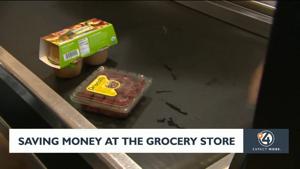SPOKANE, Wash. — With grocery prices continuing to strain family budgets, a local financial expert offers practical strategies to help shoppers save money without sacrificing quality.
Jon Maroni, a financial engagement manager at Numerica Credit Union, says families can dramatically reduce their grocery expenses by implementing some straightforward shopping techniques.
The most significant savings opportunity lies in reducing food waste. Spokane County estimates approximately 30% of household garbage consists of discarded food.
“So, what that means is that 30% of what people are spending at the store is ending up right in the garbage can. It’s like throwing those dollars away,” Maroni said. “So, if we make a list before we hit the store and stick to it, maybe we can eat into that 30% waste that the average Spokane County family is experiencing.”
Maroni’s first recommendation involves planning purchases before entering the store and creating a detailed shopping list based on actual needs rather than impulse decisions.
Maroni encourages bulk purchasing shelf-stable items as a money-saving strategy.
“Think about like your cereals, your breads, things that are going to last for a while. Bulk up on those,” he said.
Store layout awareness can also generate substantial savings. Retailers strategically position their most expensive products at eye level to capture shoppers’ attention.
“They’re placed there pretty strategically. So look up, look down. That’s where the most affordable stuff is going to be,” Maroni explained.
Generic brands represent another significant savings opportunity, often costing 15 to 30% less than name-brand equivalents while maintaining comparable quality.
Maroni also recommends conducting price research on frequently purchased items across multiple retailers.
“Look at a couple different stores and see how expensive they are at different locations. Sometimes driving a little bit further can save you significant amounts of money,” he said.
The final tip addresses shopping psychology: avoid grocery shopping while hungry. Maroni warns that hunger can lead to impulse purchases and overspending as everything appears more appealing.
These strategies become particularly valuable for families with teenagers, who typically consume larger quantities of food and can significantly impact household grocery budgets.
By implementing these six techniques — meal planning with lists, bulk buying shelf-stable items, checking all shelf levels, choosing generic brands, comparing prices across stores, and shopping on a full stomach — families can potentially reduce their grocery expenses by hundreds of dollars annually while minimizing food waste.
COPYRIGHT 2025 BY KXLY. ALL RIGHTS RESERVED. THIS MATERIAL MAY NOT BE PUBLISHED, BROADCAST, REWRITTEN OR REDISTRIBUTED.
